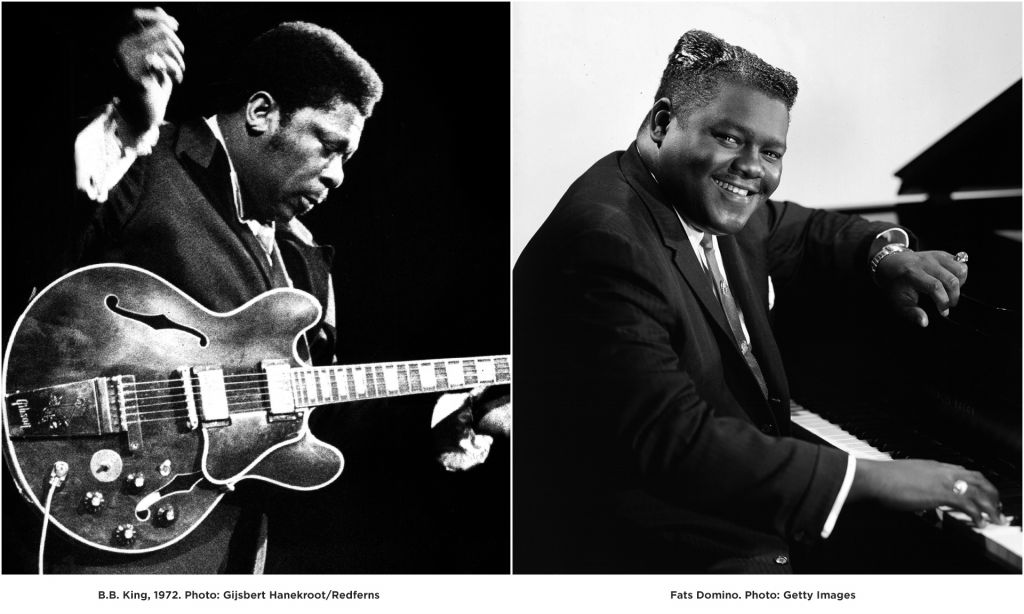 American Masters is proud to present the broadcast premieres of B.B. King: The Life of Riley and Fats Domino and The Birth of Rock N’ Roll during Black History Month this February. The iconic musicians B.B. King and Fats Domino define the very genres of music invented in America — the blues and rock n’ roll, respectively. Both men introduced the music of their birthplaces to increasingly wider circles, record by record, through grueling tour schedules across the country, and by uniting black and white fans during troubling times of segregation and violence. With their inimitable voices and virtuosic instrument playing — King on his guitar “Lucille” and Domino on his piano — their music continues to inspire and influence musicians to this day.
American Masters is proud to present the broadcast premieres of B.B. King: The Life of Riley and Fats Domino and The Birth of Rock N’ Roll during Black History Month this February. The iconic musicians B.B. King and Fats Domino define the very genres of music invented in America — the blues and rock n’ roll, respectively. Both men introduced the music of their birthplaces to increasingly wider circles, record by record, through grueling tour schedules across the country, and by uniting black and white fans during troubling times of segregation and violence. With their inimitable voices and virtuosic instrument playing — King on his guitar “Lucille” and Domino on his piano — their music continues to inspire and influence musicians to this day.
Roots
B.B. King
B.B. King (September 16, 1925 – May 14, 2015) was born in Berclair, Mississippi, on a plantation in the Mississippi Delta, two-and-a-half hours from Memphis, TN, and three hours from Little Rock, AR. He grew up in poverty working the cotton fields, and knew the violence of racism, having seen the body of a lynched man. The Reverend at his church introduced him to the guitar and he began playing blues as a teenager in Indianola, where in the 1950s, one of the first chapters of the white supremacist Citizens’ Council started. While touring in the 1960s and 70s King avoided Indianola due to its segregated eateries and hotels. In 2005, the Mississippi Senate and House of Representatives honored B.B. King with a joint resolution saluting him as a favorite son and February 15 is declared B.B. King Day. In 2008 Indianola opened the B.B. King Museum and Delta Interpretive Center and the town is King’s final resting place. Learn more about B.B. King’s life timeline.
Fats Domino
Fats Domino (b. February 26, 1928) was born in New Orlean’s historic black neighborhood of the Lower Ninth Ward after his family moved from Vacherie, Louisiana, a sugarcane-growing area near the Mississippi River (the Oak Alley Plantation there is a national historic landmark). The Dominos were a musical family and when they got a piano, 10-year-old Antoine (later to be nicknamed Fats) learned to play. He quit school at age 11 to work and soaked up the rich blues and boogie music traditions of New Orleans. At 19 he married his lifelong spouse Rosemary and they raised their family in the Ninth Ward. Once he paired professionally with local bandleader and trumpeter Dave Bartholomew, his career took off. Fats always preferred to be home rather than traveling for his many tours, and even at the height of his popularity in the 50s, his band struggled to find accommodations in segregated America. During Hurricane Katrina he was rescued from his flooded home, in which he lost nearly everything, including the National Medal of Art he was awarded in 1998. Today Domino lives in Harvey,Louisiana, across the Mississippi River from New Orleans.
Major Successes
B.B. King
Between 1948 and 1953, King’s gigs and work as a DJ at black-operated radio station WDIA in Memphis, TN, establish his reputation locally. In 1956 the blues musician spent 340 nights on the road touring. His album Live At The Regal (1964) recorded in Chicago seals his reputation as King of the Blues. In 1968, King had solidly crossed over to mainstream pop culture with his appearances at the Filmore in San Francisco and Newport Folk Festival in Rhode Island. In 1971 he wins his first Grammy for Best Male R&B Vocal Performance with “The Thrill Is Gone,” which reached #3 on the R&B charts and #15 on the Pop charts. King holds more Grammy Awards in the Blues genre (15) than any other artist and his distinctive vibrato can be recognized in just one note.
Fats Domino
In the 1950s, what black musicians call rhythm and blues becomes white America’s rock n’ roll. Domino is among the first rock n’ rollers with his song “The Fat Man” (1949). In 1955, “Ain’t That a Shame” becomes Fats’ first major rock ‘n’ roll crossover hit with white audiences and in 1956 his cover of the pop standard “Blueberry Hill” becomes his biggest hit. No one but Elvis sold more records than Domino in 1957, and as Elvis told Jet magazine, “Let’s face it: I can’t sing like Fats Domino can.” Fats tours Jamaica in early 1961, where he is treated like a king by future ska and reggae stars, whom he heavily influenced. In 1986 Domino is one of the first ten inductees into the Rock and Roll Hall of Fame. Learn more about Fats Domino’s career timeline.
—-
B.B. King: The Life of Riley will be broadcast Friday, February 12 at 9/8c on PBS.
Fats Domino and The Birth of Rock N’ Roll will be broadcast on Fats Domino’s birthday, Friday, February 26 at 10/9c on PBS.
During the broadcasts, follow American Masters on Twitter and join in the conversation using the hashtag #AmericanMasters.
